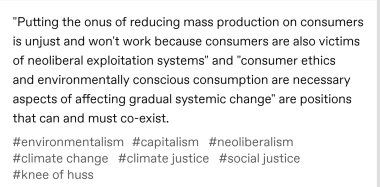we shouldn't promote individual responsibility *instead* of corporate accountability. we should promote individual responsibility *because it leads to* corporate accountability
Not my OC but what I’ve believed for years: there’s no conflict between reducing your own environmental impact and holding corporations responsible. We hold corps responsible for the environment by creating a societal ethos of environmental responsibility that forces corporations to serve the people’s needs or go bankrupt or be outlawed. And anyone who feels that kind of ethos will reduce their own environmental impact because it’s the right thing to do.
Thoughts?




Add comment